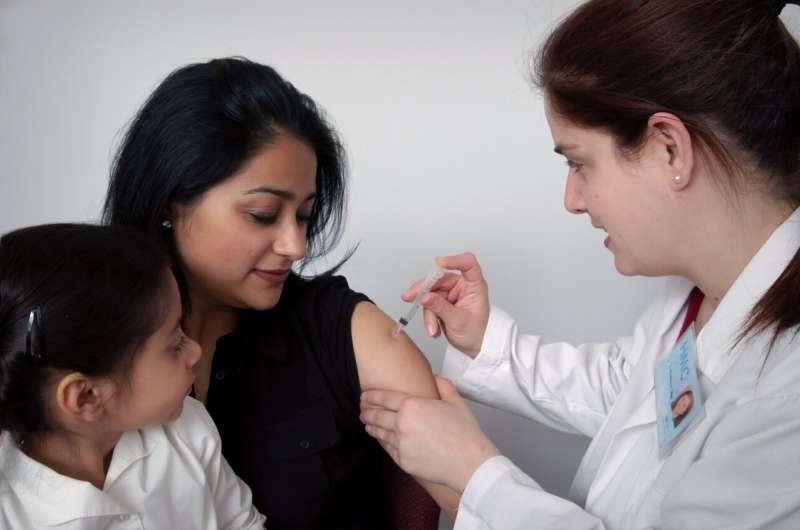UK citizens of South Asian heritage most likely minority ethnic group to choose COVID vaccination

People of South Asian origin are the most likely of all Britain’s minority ethnic communities to agree to COVID-19 vaccination—the safest way to reach population immunity, a new study reveals.
In the first survey focussing on the UK’s Black and Minority Ethnic (BAME) population and other high-risk groups identified for priority vaccination, researchers discovered that from 4,884 respondents, 79.3 percent were interested in taking approved vaccines.
Within the BAME community, people of South Asian ethnicity such as Indian, Pakistani and Bangladeshi, showed more interest towards uptake of the approved COVID-19 vaccine.
Study co-author Dr. Anandadeep Mandal, from the University of Birmingham, commented: “There is little evidence to suggest that the spread of COVID-19 will stop naturally through population immunity and the cost of natural infection would be very high—men, older individuals and those with comorbidities would be disproportionately affected.
“An effective vaccine may offer the safest way to reach population immunity, but vaccine hesitancy is a potential obstacle as vaccine uptake rates can also vary across different communities and ethnicities.”
Publishing their findings in BMJ Open, the researchers discovered that Britain’s BAME community in general is more likely to accept approved vaccines when compared to the non-BAME community. Other key findings include:
- Amongst the ethnicity groups, the BAME community was more likely to accept the COVID-19 vaccine;
- Graduates were more likely to take the vaccine compared to the non-graduates;
- Men were more likely to take the approved vaccine; and
- Respondents aged 50 and above were more likely to accept the approved COVID-19 vaccine compared to younger participants.
- Researchers note there have also been racial disparities surrounding trust in vaccines, where the BAME community are less likely to trust pharmaceutical companies and government strategies.
One main reason for a potential increase in uptake with the COVID vaccine may be due to the disproportionate number of COVID-19 deaths in the BAME population with a third of these patients being admitted to intensive care units.
“We must target the needs of increased participation from the BAME community, young people, and those with no diagnosed health conditions to uptake approved COVID-19 vaccines,” added Dr. Mandal.
“This will allow the UK to effectively reach population immunity thresholds nationwide, and in controlling further outbreaks of this rapidly spreading disease. Widespread vaccine uptake will be a crucial turning point in rebuilding the nation’s social, health and financial losses from this unprecedented pandemic.”
The study is the UK’s largest cross-sectional examination to explore the key drivers and barriers to COVID-19 vaccine uptake at this pivotal time.
It is also the first survey to focus specifically on the BAME population and other high-risk groups identified as the government’s priority for vaccination. Insights are proving valuable in delivering, supporting, and promoting adequate uptake for the population-wide vaccine program.
The study was conducted in collaboration with NHS Trust and National Institute of Health Research, UK. The details of the findings were presented and discussed with the UK Government Vaccine task force prior to the launching of the on-going vaccination program.
The survey had 4884 respondents. Overall, 3873 (79.3 percent) respondents were interested in taking approved vaccines, whilst 677 (13.86 percent) respondents were unsure and only 334 (6.9 percent) stated that they were not going to take the vaccine.
The study identified 16 reasons cited by the respondents for not taking approved COVID-19 vaccines. Of all the rationales stated, “unless completely tested with no proven side effect” is the key reason for COVID-19 vaccine hesitancy.
Source: Read Full Article


